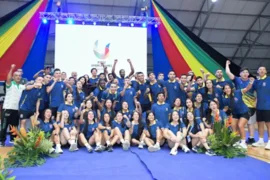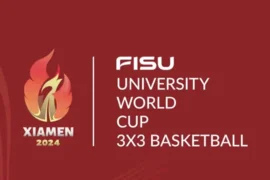 |
 |
|
EUSA Newsletter 12-2024, ISSN 1855-4571
|
On November 16th, at the Palais Liechtenstein in Vienna, Austria, the European University Sports Association celebrated its 25th anniversary with a Gala dinner, gathering the presence of representatives of member federations, partners, institutions, and distinguished individual guests. Vienna is not just any venue for EUSA's celebrations. Founded in this very city in 1999, it embodies the organization's history, making it the perfect stage for this momentous occasion. This special occasion was held in the heart of Vienna, the city where it all started, hosted by the Austrian University Sports Organisation and the University of Vienna. The 25th Anniversary Gala served as a gathering to commemorate a remarkable milestone in the EUSA journey, built on passion, dedication, and commitment to excellence in the world of university sports. This remarkable celebration was opened with the words given on behalf of Ms Hemma Angerer, President of the Austrian University Sports Organisation. Ms Angerer wished all the present guests an evening of joy and delight, pointing out and congratulating EUSA on this important milestone. The second warm welcome was given on behalf of EUSA President, Mr Adam Roczek, thanking each of the guests for their presence and for their support and cooperation for the past 25 years. After the two honourable welcoming speeches, the programme of the Gala Dinner was opened by the first act of the cultural part, which was an amazing music performance by the Vienna Opera Ball Orchestra under the direction of Chief Conductor and Artistic Director, Univ.-Doz. Mag. Laszlo Gyüker. Viena Opera Ball Orchestra performed a few of their amazing musical acts throughout the Gala night. The musical performance was accompanied by a dance performance from the Svabek Dance School, which has been responsible for the artistic choreography of the dance interludes at the Vienna Opera Ball for many years. Being in Vienna, the birthplace of EUSA, and reflecting on the last 25 years, EUSA is proud to celebrate a journey defined by collaboration, dedication, and support. It is with great pride that we acknowledge the invaluable partnerships that have helped shape our shared success. The remarkable 25th Anniversary Gala dinner concluded with a gratitude message expressed by Mr Adam Roczek towards the Austrian University Sports Organisation, the University of Vienna, and EUSA staff members. A celebratory group photo officially closed the Gala dinner held in the beautiful Palace Liechtenstein. EUSA expresses heartfelt gratitude to the hosts and to all representatives of the member federations, partners, guests, and friends for being part of the celebration of the 25th-anniversary milestone. More information...
Last chances to bid for EUC 2027
04 November 2024
|
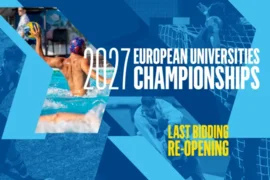
|
|
The bidding for the 2027 European Universities Championships has been reopened today, offering another possibility for interested parties to bid and become the next organizers.
|
TUSF elects new President
06 November 2024
|
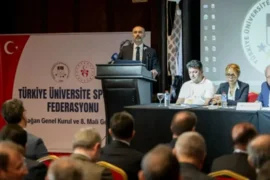
|
|
On the occasion of the 6th General Assembly of the Türkiye University Sports Federation (TUSF) held on November 4, 2024, in Ankara, the new president of the federation was elected..
|
EUSA continues its commitment in safeguarding
07 November 2024
|
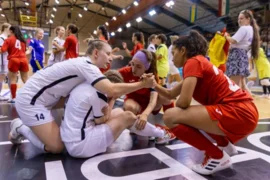
|
|
European University Sports Association (EUSA) and its Institute have taken part in several initiatives on safeguarding in sport, and we can highlight some that directly or indirectly addressed the topic.
|
Portugal University Sports Gala awards the best of season 2023-2024
14 November 2024
|
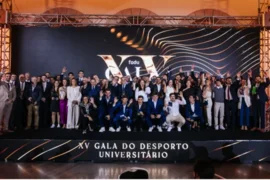
|
|
The 15th University Sports Gala, organized by the Portugal University Sports Federation (FADU), was held in Viseu, at Pousada Pestana, on November 12th, and brought together the academic and sports community to celebrate the achievements related to the 2023/2024 season.
|
EUSA Executive Committee meets in Vienna
15 November 2024
|
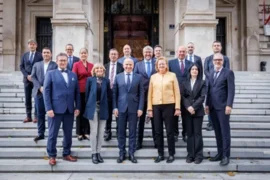
|
|
Executive Committee members of the European University Sports Association (EUSA), office staff members, and invited delegates met on November 15 in Vienna, Austria.
|
Outstanding EUSA Conference 2024 held in Vienna
16 November 2024
|

|
|
The 2024 EUSA Conference was held at the University of Vienna in Austria and brought together important guests and the highest authorities in European University Sport.
|
International Students' Day 2024
17 November 2024
|

|
|
November 17 marks the International Students’ Day, which celebrates the multiculturalism of students and encourages quality education to be accessible and available to all.
|
EUC Rowing to be held in Bydgoszcz in 2025
20 November 2024
|

|
|
The city of Bydgoszcz, Poland, will be hosting the European Universities Championship in Rowing, in 2025. The event will take place from September 18-21.
|
European Week of Winter Sport seminar held in Croatia
20 November 2024
|
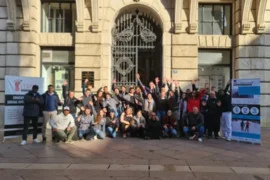
|
|
Within the European Week of Winter Sport (EWWS) project, a seminar with workshops was organised in the town hall of the coastal Croatian town of Rijeka from November 15th and 17th.
|
EUC Volleyball coming to Budapest in 2025
21 November 2024
|

|
|
The city of Budapest in Hungary will host the European Universities Volleyball Championship in 2025. The event will take place from 27 July to 3 August.
|
International conference on sustainability and legacy in sport 2024
21 November 2024
|
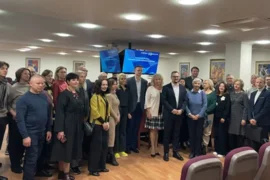
|
|
On 20 and 21 of November, for the 8th consecutive time, the National University of Ukraine on Physical Education and Sport hosted a traditional scientific forum dedicated to discussions on the social, environmental, economic, and organizational dimensions of sports...
|
EUC Tennis and Padel to be hosted by Combra in 2025
25 November 2024
|
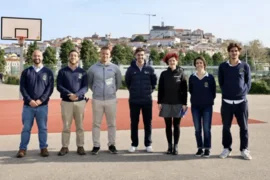
|
|
The city of Coimbra, Portugal, will be hosting the European Universities Tennis and Padel Championships in 2025. The event will take place next summer from 28 July to 3 August.
|
European Sport Platform 2024
25 November 2024
|
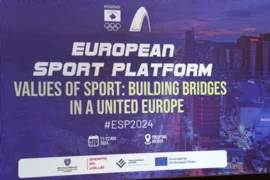
|
|
This year, for its seventh edition, ENGSO organized its European Sport platform from the 21st to the 23rd of November in Pristina, Kosovo, hosted by the Kosovo Olympic Committee.
|
EUC Football headed to Camerino in 2025
27 November 2024
|

|
|
The city of Camerino in Italy will host the European Universities Football Championship in 2025. The event will take place from 27 July to 3 August.
|
ADH General Assembly held in Goettingen
27 November 2024
|
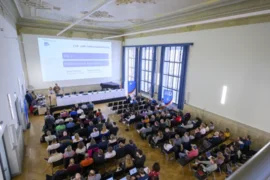
|
|
On November 24 and 25, 2024, the membership of the German University Sports Federation (ADH) convened in Goettingen for its 119th General Assembly to review the past year, make forward-looking decisions, and hold regular board and committee elections.
|
#BeActive Awards 2024
28 November 2024
|
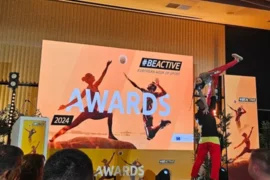
|
|
The European Commission organised the #BeActive Awards ceremony on November 26, celebrated as a hybrid event, with in-person attendance in Brussels, and via online streaming.
|
EUC Handball to be held in Covilha in 2025
29 November 2024
|
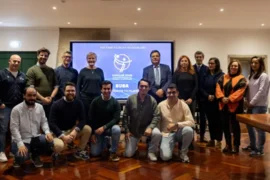
|
|
The city of Covilha in Portugal, will be hosting the European Universities Handball Championship in 2025. The event will take place from 22-28 July 2025.
|
2025 Erasmus+ and ESC Calls & Guides available
30 November 2024
|
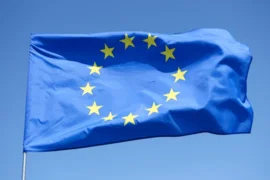
|
|
The European Commission published the new Erasmus+ Call for Proposals and Programme Guide for 2025, as well as the Call and Guide for the European Solidarity Corps (ESC) for next year.
|
|
 |
| FISU Section |
|
|
 |
| Important Dates Coming Up |
|
 |
| What's up! - Student Column |
International Day for the Elimination of Violence against Women
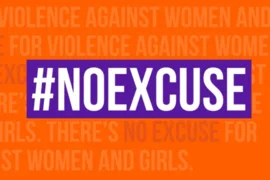 In this month’s What’s up student column, our EUSA ESC volunteer, Milia Molinie, on the occasion of the International Day for the Elimination of Violence against Women, shares her research and viewpoint on this topic related to women athletes and women in sports. In this month’s What’s up student column, our EUSA ESC volunteer, Milia Molinie, on the occasion of the International Day for the Elimination of Violence against Women, shares her research and viewpoint on this topic related to women athletes and women in sports.
November 25th, followed by the global 16 Days of Activism Against Gender-based Violence is a global call to action to raise awareness, amplify survivor voices, and accelerate efforts to end violence against women and girls in all its forms.
At the European scale, in 2011 the so-called Istanbul Convention was the first instrument in Europe to set legally binding standards specifically to prevent gender-based violence, protect victims of such violence and punish perpetrators. Ever since, the parties of the Convention took steps to prevent forms of violence in different spheres of public and private life.
In sports in particular, women and girls are faced with specific risks, combined with ineffective or nonexistent prevention and response mechanisms. Indeed, according to a recent UN Women report, 21% of women experienced a form of sexual abuse at least once as a child in sports. Reem Alsalem, the UN Special Rapporteur on Violence against Women and Girls, is sounding the alarm about the situation of women and girls in sport through the last Report on violence against women and girls in sport, published by the United Nations (A/79/325). Indeed, the world of sports is not just a platform for competition and results but a reflection of the societal dynamics that govern our lives. While sports have the potential to empower and elevate, they are not immune to the scourges of society, particularly violence against women and girls. Moreover, although women participation in sports is on the rise, we tend to forget that on a historical scale, it is a recent phenomenon.
Indeed, on an international level, the International Olympic Committee instated the obligation of women participating in every sport through its Charta, only in 2007, and Paris2024 was the first event to reach the IOC’s agenda goal of gender parity in a sports competition. However, gender parity differs from gender equality. In fact, equality implies deconstructing the roots of inequality that underpin patterns of violence. The Council of Europe defines gender equality as “ the equal visibility, autonomy, responsibility and participation of both sexes in all spheres of public and private life”.
Through its paper “Strategies and recommendations for a Safer Playing Field”, UNESCO highlights the specificities of sports environments when it comes to violence: “(...) traditionally male-dominated environments, combined with ineffective governance structures, a lack of transparency, and the prioritization of sport profits over individual well-being contribute to deeply rooted power imbalances, negative gender stereotypes, and the normalization of abusive practices and cases of violence.”
Furthermore, “violence” is an umbrella term that can affect different spheres of someone’s life: financial, emotional, physical, sexual and psychological. In this article, we will adopt an intersectional approach through three portraits of women athletes who fought and still fight for their rights and a better consideration of violence in sports. They truly embody the power of Speaking Out and their voices drive needed changes in the sports environment.
Financial barriers fading away: Nneka Ogwumike
Even though we may think that the WNBA league reached equality in terms of media coverage compared to the NBA, in particular with the rising star Indiana Fever player Caithleen Clark, the reality is different. The league has faced steep financial shortcomings, leaving its players well short of being compensated at the levels of their male counterparts.
Right now, WNBA players remain locked into the collective bargaining agreement, or CBA (Collective Bargaining Agreement), signed in 2020, which dictates their overall pay terms. Since the deal was signed, the revenue generated by the WNBA has grown — yet it still pales in comparison to those generated by the NBA.
At the forefront of this milestone, there was Nneka Ogwunmike, president of the WNBA Players Association. Nneka Ogwunmike is an american basketball player, currently playing in the Seattle Storm WNBA team. She has an impressive resume: No. 1 overall pick in the 2012 WNBA draft, WNBA champion, MVP, Rookie of the Year, six-time All-Star, All-WNBA first team, four-time All-Defensive first team, World Cup champion, EuroLeague champion, even a Polish League champion.
She led the renegotiation of the WNBA’s Collective Bargaining Agreement. This ground-breaking deal resulted in a 53 percent salary and bonus increase; and better travel and childcare experiences and off-season career opportunities, according to WNBA.com. “I think we realized that it was more than just equal pay,” said Nneka Ogwumike,”It was equality and fighting for what we deserve moving forward.” Ogwumike said the players were able to make a deal that “improves almost every aspect of their daily lives as professional athletes. Beyond significant base salary increases, the deal includes performance-based bonuses, plus paid maternity leave and fertility and adoption benefits, as well as entitlements for more comfortable travel and expanded marketing opportunities.
There are still a lot of aspects to work on, but Nneka significantly helped improve a league that used to be far from fair when it came to the financial security of their players. Besides from the league income, there are also sponsoring revenues, which, according to a recent UNESCO Report, only 0,4% of it, worldwide, goes to women athletes.
Bouncing back: Angelique Cauchy
Writing this portrait, it seems like there are no words appropriate enough to describe Angelique Cauchy’s story. She chose to share what she went through, in order to prevent other women from experiencing it.
On January 13th of 2021, her aggressor was sentenced with 18 year’s imprisonment for rapes and sexual assaults on minors and a lifetime ban on contact with minors. He was her tennis coach and she was not his only victim. The point of the portrait is not to go into more detail about the facts, but to highlight her courage and determination in the process of first naming her aggressor, and secondly, raising awareness about blind spots in sports clubs and through the relationships between athletes and coaches.
According to a recent study from the European Commission, 55% of female athletes have been victims of sexual harassment and/or abuse during their career. These figures show how important it is to break the silence and combat this systematic violence. Addressing the prevalence of violence in sport can be challenging – coaches and other athlete entourage often lack comprehensive education on recognizing and addressing violence, and policy makers wishing to act on it must navigate complex, multi-stakeholder sport ecosystems. Cases of male violence against women and girls in sport remain significantly underreported due to a lack of clear and effective reporting processes, a fear of retaliation, and a general mistrust of existing mechanisms.
In fact, when asked about Angelique’s tennis coach, the club managers replied at the time that he may have particular methods, but he was winning titles and tournaments for the club. Besides, according to UNESCO, 94% of coaches report that their athletes seek their support regarding personal problems. Thus, the priority should be on education and prevention within sports clubs, in order to avoid grey areas and transgressive behaviors, defined as “any form of misuse of a relationship of power that violates someone’s access to safe sports.” Haandrikman & Schipper-van Veldhoven, 2024).
Angélique Cauchy is now a sports teacher in middle-school and she just published a book entitled If someone hurts you someday that she presented to her students. Moreover, she is committed to children’s rights and the protection of minors. Together with her co-victims in 2017, they created an NGO called “Rebond” (“Bounce”, in English), that prevents violence through training, prevention and awareness-raising for young athletes, parents, coaches and volunteers; and for leagues, committees and clubs.
She may not be in the ATP rankings today, but she is truly moving mountains in order to build safer environments for young athletes and future generations. Angélique Cauchy is the definition of resilience, altruism and determination, among many other remarkable traits.
Punching back: Joanna Harper
Among the popular opinions, transgender women such as Joanna Harper have athletic advantages over non-transgender women— called cisgender women—because of their previous exposure to male levels of testosterone. But Harper, a medical physicist at a medical center in Portland, Oregon, and an athlete, has been challenging that assumption with scientific data. In 2015, she published the first study of transgender athletes' performances, finding that transgender women who received treatment to lower their testosterone levels did no better in a variety of races against female peers than they had previously done against male runners. Although Harper's study included only a few transgender women, Eric Vilain of The George Washington University in Washington, D.C., a geneticist who specializes in gender-based biology, calls it "groundbreaking”. With this contribution to research, Joanna Harper has been advising the IOC in the reflections of the policy making in terms of gender inclusion in sports.
One of the main issues when it comes to non cis-people participation in sports, is the definition itself of what makes a female athlete. Professional female athletes went through “nude parades” to prove their sex in the 60s, then went through chromosomal and hormonal tests. However, biology does not always clearly divide human beings into two sexes, especially when it comes to intersex athletes.
As scientific data is still very recent and yet does not make consensus in the sports community, transgender athletes and in particular female athletes often go through violent backlashes and are accused of stealing cisgender women seats in the sports community. They are often victims of many forms of violence, in particular psychological, online and in the public space. After the Tokyo Olympic Games in 2021, a Report was published on discriminatory behaviours through social media. 87% of them targeted Women, 29% of them were sexists, 26% racists, and 9% transphobic.
Online harassment is a major issue in our everyday life, but particularly during major sports events, and as the numbers tell, women and the LGBTQ+ community are the first target. The British cyclist Emily Bridges said indeed that transgender women are the “current punching bag” in society and are the targets of “the culture war”.
In order to prevent that, sports organisers set more and more effective moderating systems online, as the organizing committee of Paris2024. In fact, the IOC set up the first ever (AI)-powered cyber abuse protection service, described as the “largest and most comprehensive service of its kind in sports history”. The key insights of the system are appealing: 353 athletes/officials were directly targeted with abuse, and the dominant type of abuse was gender-based, with sexual/sexist violence specifically targeted at female athletes. This data highlights the fact that gender is a thorny issue on and off the pitch.
Besides her scientific studies, Joanna Harper is well aware of the deeply rooted challenge of inclusion in sport competitions: “What I would suggest is that it is impossible to maximise inclusion, maximise fairness, maximise safety in sport, all three of those, without some impact on the other”. Through her shadow work, she is significantly contributing to have a better understanding for transgender people participation in sports in the future.
To conclude, gender equality in sports still has a long way to go until it reaches elimination of violence of any kind. Sports competitions seem to represent a living laboratory reinventing its own rules in order to improve inclusivity and safety. The initiatives led by the women we mentioned, just like many others, are worthy of a closer look, because they will lead to key changes even outside of the sports environment.
Even though definitions are not clear yet, and this is sometimes a tough nut to crack, communities need spontaneous and collective initiatives, without having to wait for a consensus. Women voices speak up all over the world, trying to tackle appropriation, representing empowerment.
At EUSA, women athletes participation has increased by 2% for both the Games and the Championships between the last competitions. In 2024, at the European Universities Games 52% of the athletes were men, while 48% were women. In some sports, like Beach Volleyball, we had 50%-50% participation among athletes. In Tennis and Volleyball the percentage of women athletes was bigger than the men. It may seem insignificant, but it reflects the initiatives of the national federations and the inclusive politics that aim to collectively encourage women’s sport. We are determined to make EUSA’s competitions more and more inclusive, and to keep making sports a safe place for women and gender minorities by preventing violence of any kind.
The author of the text is Milia Molinie from France, graduate with a Master degree in international cooperation and development from both universities of Bordeaux, France and Turin, Italy, who is currently serving as a European Solidarity Corps volunteer at the EUSA Office in Ljubljana.
Are you a student with an opinion? We are looking for new contributors for our student column every month. Feel free to contact stc@eusa.eu to offer a piece or propose a topic.
read more >>
Your Data and Privacy:
EUSA GDPR: General Data Protection Regulation
Published by:
European University Sports Association (EUSA)
Office: Tomšičeva ulica 4, SI-1000 Ljubljana
Realisation/Main editor: Andrej Pišl
tel: +386 1 256 0056, web: www.eusa.eu
social: Facebook | X | Instagram | Threads | YouTube | LinkedIn | #eusaunisport #myeusa
|
 European University Sports Association European University Sports Association 
|
|























